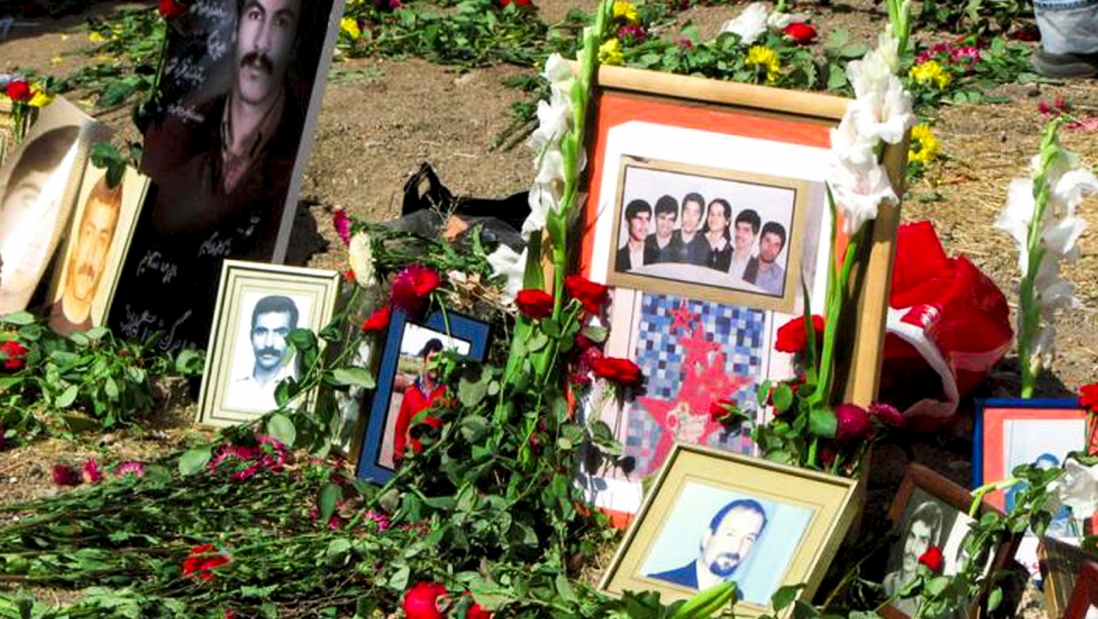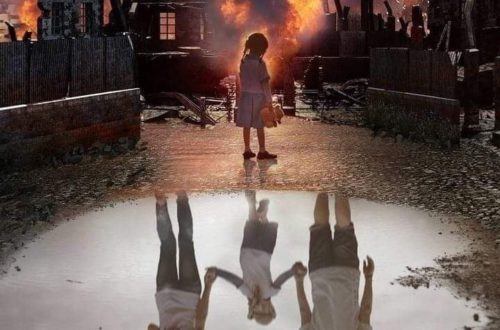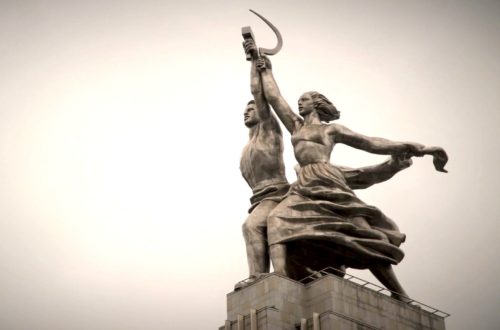
They Are Still Young
“They Are Still Young” is a heart wrenching narrative which sheds light on one of the most bitter and gruesome acts of inhumanity committed by the the Islamic Republic regime in the summer of 1988: the genocide of the dissidents.
Through the medium of Magical Realism, Ali-Ashraf Darvishian, the author, creates an incredibly powerful scene where the dead come to life and converse with one another and with their survivors.
Although Darvishian is mostly known for his Social Realist style which depicts the cold hard facts of life in class society, here he utilizes the marvels of Magical Realism to bridge between the dead and the living, between the past and the present where both coincide. But while in the world of the living everyone has aged, in the world of the dead, “they are still young” and will always be so for they are undying; the undying martyrs of the people.
A. Behrang
December 27, 2021
They Are Still Young
By: Ali-Ashraf Darvishian
You bring them out of your purse. You bring out Daddy, then Sis and then Junior. You place them by the red and white carnations near the tulips and candles. The corner of Daddy’s photo is bent but you hide the crease behind the gladiolas. Your hair has turned grey. All the mothers’ hair have turned grey. They take their children out of their purses tucked in an envelope wrapped in a handkerchief or a piece of cloth, and place them beside the flowers and candles. Daddy’s leaning on a gladiola. His hair is black. His moustache is black and thick. His eyes are sparkling. His lips begin to move:
“Since our last visit, I’ve been thinking of you. Remembering your outburst and the tearing of your eyes. Being away from each other is painful, but it mustn’t make us neglect life. We have no right to deprive ourselves of the boons of life. We mustn’t ruin the children’s morale. I leave our children to you and I know that being blessed by your kindness they will turn out to be decent and loving.”
You would trick me telling me that they had gone on a trip but when you were forced into taking me to see Daddy, to see Junior, to see Sis, then I realized what had happened. Daddy himself had asked to see me one last time. He kissed me and said:
“Kiss me sweetheart! Kiss me for the rest of your life, kiss me as much as you want. Save up! It’s going out of stock soon you know! Afterwards you’ll regret that you didn’t kiss me enough!”
And then I kissed him a thousand times.
Khorshid’s dad has leaned on the carnations. Mazdak (Junior) has pulled one of the flowers onto his own photo and he’s smelling it. His mother strokes his photo:
“Oh you the brightness of dawn, come back once more to the East!”
Meanwhile, Khatereh’s Dad is looking at the crowd from behind the carnations, searching for his daughter, saying:
“He threw me into the cell and took away my blindfold. I recognized him! Many years ago, we were both in that same cell. Even to this date, I can read him the very slogans he himself used to write on those walls. He shut the door on me and locked it. He was about to leave, when I placed my mouth on the hole in the door and said: wait a second, I have something to say to you!
He turned and opened the door.
I said: you and I, once upon a time were in this very cell, do you remember!? Those nights when our feet were both beatened up!
He turned red. Looked down, and left.”
Khatereh’s mother looks towards Khorshid father’s photo and says:
“Do you remember the song you used to sing in your cell? Every sunset when I was heavyhearted, I would wait to hear your voice from across the ward singing”:
You were with us! You went with us! Like the fragrance of a rose, where did you vanish? I’m left on my own, you have left on your own! When the caravan is to leave, I lose my mind. Away from my love, I cry blood!
One mother, wipes her tears and excitedly shouts:
“My children. These are my children! All of them, all five of them! All together.”
Her daughter from inside the photo looks at her:
“Mother, I learned selflessness from you.”
The mother says:
“But you know dear, you were all I had, you were my life!”
The oppression of the oppressor,
the cruelty of the trapper has ruined my nest!
Her daughter says:
“Then now that you are seeing us, don’t cry! Your eyes have turned red! The have puffed up! Now that you are sitting right beside us, you should be happy!”
“Ok, I won’t cry. But tell me, is your husband here with you all?”
“Don’t you see him there? Right there, right among the carnations.”
The mother turns towards the carnations. She sees her son-inlaw and mourns:
“Oh my sweet Joseph, then where is your shirt?
Where was your blood spilled?”
Away from the clamor of the crowd, the photos have gathered around and are talking with one another:
“Our mothers have all grown old.”
“When they took me away from home, her hair wasn’t white.”
“Look at my sister! Why has her hair turned grey, but my hair is still the same?”
“Back then when they were searching for us, one day mother came close to me. I shouted, Mom! Dearest Mom! I’m right here. Come and sit beside me! She didn’t hear me. She went away. She didn’t find me. She placed her flowers and candles on another grave and sat there pouring her heart out while shedding tears.”
Sepiedeh’s dad says:
“At the end, one day they’ll find us and place their flowers and candles right beside us.”
Mahien’s dad says:
“Yes, and then they’ll shout with surprise: Oh you’re still young!?”
One of the photos reaches out and gives a carnation to his wife:
“Whether you think of me or not, I’ll never stop thinking of you.”
And his wife replies back:
“I’ll await you when night falls…”
One sister talks to her brother’s photo from afar:
“Come to my dream one night and tell me where you are? How long do we have to search for you, how long?”
Her brother, from inside the photo, reaches toward a burning candle but remains silent. His mother kisses her son’s photo:
“Speak Nazli, speak!”
Nazli spoke none
A violet he was
Bloomed and heralded:
“The winter is over!”
And vanished he so…
One of the mothers was kissing her daughter’s photo. She was caressing her hair:
“My little one! But you were only twelve. Sweet eyed daughter of mine.”
One of the photos, with candle-tears on it, was asking his wife with a Kermanshahi accent:
“Then where is our little one? I don’t see him here.”
His wife quickly wipes away her tears and says with a trembling voice:
“Last year he came towards you. Haven’t you seen him? What if he’s got lost on the way here?”
A girl is smiling near one of the planters:
“Mother don’t cry, come sit beside me! I’ve missed you so much. And now that you’ve come here you are just crying.”
The woman wipes her tears. It’s time for them to depart.
Thereupon ended the Winter
Thereupon bloomed the Spring
Thereupon came hither the red rose of the sun
Thereupon fled the night
The mountains carpeted by tulips
The tulips all vigilant, the tulips all awake
They till the sun bloom by bloom
There in the mountains, their hearts all awake
There they bring rifles and roses and wheat
There within their hearts, O’ what hearts!
There a forest of stars, O’ so many stars in their hearts!
The mothers pick up their children from among the flowers and candles. Very gently, they wrap them within the cloths and tuck them in the envelopes. They put them inside their purses and take them home.
Translated by: A. Behrang




One Comment
Rachel
“Mazdak (Junior) has pulled one of the flowers onto his own photo and he’s smelling it. ” I have read this narrative several times and it is at this sentence that I cannot control my tears. Heart wrenching indeed!
The author has created the scenes throughout each line of the personal tragedy wrought upon so many by this brutal regime. My weeping each time upon reading this masterpiece is, in my opinion, proof of its brilliance.